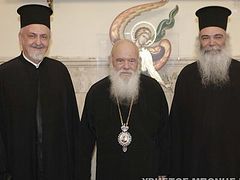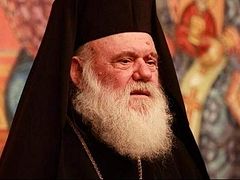Nafpaktos, Greece, April 4, 2019
His Eminence Metropolitan Hierotheos (Vlachos) of Nafpaktos, widely considered one of the Orthodox Church’s foremost theologians today, has published his opinion on how the Church of Greece should respond to the Patriarchate of Constantinople’s actions in Ukraine.
Discussing the history of how the Churches beyond the ancient Pentarchy became autocephalous, the content of their respective tomoses of autocephaly, and the Patriarchate of Constantinople’s role in the process of granting them autocephaly, he ultimately concludes that the Church of Greece has no right to disagree with Constantinople’s actions in Ukraine, lest it call its own autocephaly into question.
Moreover, in Met. Hierotheos’ view, the Synod of the Church of Greece does not even have the right to consider the issue, which would constitute meddling in the affairs of another Church.
The Greek hierarch prefaces his remarks by noting that he is not on the Synod’s committees for examining the Ukrainian issue, so what he writes is simply his personal view on the matter.
He writes: “The Ecumenical throne has the same honor as that of Old Rome and after its departure (from the Church), New Rome became the first throne of the Church with special prerogatives and rights”—a statement with which all Local Orthodox Churches agree.
However, in his view, except for the original five Patriarchates—Rome, Constantinople, Alexandria, Antioch, Jerusalem—all others Patriarchates bear the title only through economia and the good pleasure of Constantinople. They are in some sense not full and complete autocephalous Churches, because they exist at the discretion of the Patriarchate of Constantinople and have never been ratified by any Ecumenical Council.
In Met. Hierotheos’ view, autocephaly means that Local Churches cannot interfere in one another’s affairs, but, notably, he says the Patriarchate of Constantinople is not simply a Local Church, so this restriction does not apply to it. Moreover, he says everyone basically always knew and understood this, and that it’s written in their own tomoses of autocephaly, so why, he asks, should they be surprised now with the Ukrainian situation?
Therefore, “The Local Church of Greece does not have the right to oppose the decision of the Ecumenical Patriarchate with regard to its actions in the Church of Ukraine” the hierarch of Nafpaktos writes. The issue of new autocephalous Churches should be dealt with by an Ecumenical Council, he argues, not by individual Synods making resolutions.
The Church of Greece “can only approve of the (aforementioned) decisions by expressing its common vision and action with its vote” at an Ecumenical Council, he says, adding that, “Not accepting the way in which autocephaly was given to Ukraine also calls into question the autocephalies of the other eight churches, including the Church of Greece.”
His Eminence also addresses the issue of Constantinople’s accepting of unordained schismatics as clergy—an issue that has proven troubling for several Local Churches, including those of Romania, Cyprus, and Albania, and hierarchs from other Local Churches. Met. Hierotheos writes that it is a complicated issue that requires cooperation with Constantinople, but the tomos of the Church of Greece forbids it from questioning Constantinople’s decisions. Therefore, if the Church of Greece outright questions or opposes Constantinople, it calls its own autocephaly into question. Therefore, the bishops have only to ask Constantinople for its explanation for this decision.
He ends by saying that the Church of Greece cannot even take a vote about the Ukrainian issue, because that would constitute meddling in another Church’s affairs—again, the issue belongs to an Ecumenical Council.
In the same vein, he notes that the Church of Greece also cannot comment on the affairs of the Church in the “New Lands” in northern Greece, because it belongs to the “most holy Apostolic and Patriarchal throne.”
Follow us on Facebook!




